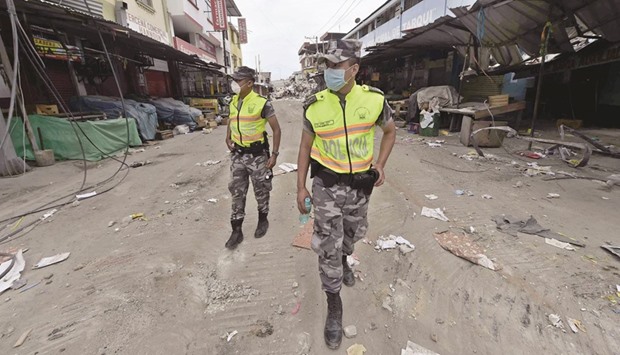The death toll from Ecuador’s devastating 7.8 magnitude earthquake last week has risen to 646 people, President Rafael Correa said during a TV broadcast yesterday.
Last Saturday’s quake, the worst in nearly seven decades, injured around 12,500 people and left 130 missing along the country’s ravaged Pacific coast.
“These have been sad days for the homeland,” a visibly moved Correa said during his regular Saturday television broadcast. “The country is in crisis.”
Several strong tremors and more than 700 aftershocks have continued to shake the country since the major quake, sparking momentary panic but little additional damage. Tremors are expected to continue for several weeks.
With close to 7,000 buildings destroyed, more than 26,000 people were living in shelters. Some 14,000 security personnel were keeping order in quake-hit areas, with only sporadic looting reported.
Survivors in the quake zone were yesterday receiving food, water and medicine from the government and scores of foreign aid workers, though Correa has acknowledged that bad roads delayed aid reaching some communities.
Correa’s leftist government, facing mammoth rebuilding at a time of greatly reduced oil revenues for the Opec country, has said it would temporarily increase some taxes, offer assets for sale and possibly issue bonds abroad to fund reconstruction.
Congress will begin debate on the tax proposal on Tuesday.
Correa has estimated damage at $2bn to $3bn. Lower oil revenue has already left the country of 16mn people facing near-zero growth and lower investment.
The country’s private banking association said yesterday its member banks would defer payments on credit cards, loans and mortgages for clients in the quake zone for three months, to help reconstruction efforts.
A 6.0-magnitude quake on Thursday was followed by smaller aftershocks Friday morning, ranging in magnitude from 4.0 to 5.2, said Ecuador’s Geophysics Institute.
The shaking could be felt in Manabi province, most affected by last week’s 7.8-magnitude quake, as well as in the provinces of Esmeraldas and Los Rios, and in the cities of Santo Domingo, Guayaquil and the capital Quito.
But there were no immediate reports of new casualties or damage.
A carpenter who declined to give his name was among the legions trying to fetch a few belongings from their ruined homes, despite the heavily damaged roads.
“Why stay?” he asked, his eyes filled with tears. “My wife died. I have nothing left to do here.”
The UN appealed Friday for $72.7mn to provide aid to 350,000 people over the next three months - about half the number it estimates are in need of help.
Humanitarian organisations warn the country still faces huge risks, as the homeless are now prey to disease-bearing mosquitoes and dirty drinking water.
Electricity and water supplies are only being slowly restored.
Many businesses in affected areas have closed their shutters, fearing looters - which has made it all the more difficult to find food and basic necessities.
The quake crumpled hundreds of buildings up and down Ecuador’s Pacific coast, turning picturesque resort towns into something resembling a war zone.
The smell of decomposing bodies has grown increasingly powerful in the tropical heat as workers continue searching for corpses in the ruins.
The World Bank agreed to loan $150mn to Ecuador to boost relief efforts.
And France yesterday announced it would send in a 30-strong team from the public security office to Ecuador, as well as 21 tonnes of relief supplies including water treatment units.
Officials say 113 survivors have been rescued from the rubble, but hopes of finding any more are slim.
In the port city of Manta, Andrea Figueroa, a young doctor who flew in from Mexico to help with the emergency response, has been scouring the ruins since Monday with her team, a rescue dog and a special scanner to detect vital signs in the rubble.
“There are no more survivors here,” she said as they climbed around the remains of a hardware store.
Fire chief Eber Arroyo from the Ecuadoran capital Quito said the “operational threshold” of the rescue effort was over.
“At this point, we are now managing decomposing bodies,” he said.
The quake has left people traumatized, and the hundreds of aftershocks are only exacerbating it, said Catholic priest Ivan Onofre in Tasaste, near the devastated town of Pedernales.
“People are nervous, confused, expecting the worst, as if the most powerful (earthquake) had yet to hit. They have been affected psychologically,” he said.
The quake came as a particularly severe blow to the tourism sector, just as the government was launching a major push to attract more visitors.
The South American country had only recently aired a Super Bowl commercial touting its beaches, islands and other charms - the first country ever to buy the American football championship’s notoriously expensive ad airtime.
“We are worried about what comes next, how to rebuild and what to do so people can keep their jobs and prevent this from becoming a social crisis,” said Jose Ochoa, head of the Ecuador Hotels Federation.

Ecuadorean policemen guard the devastated Tarqui suburb of Manta town
